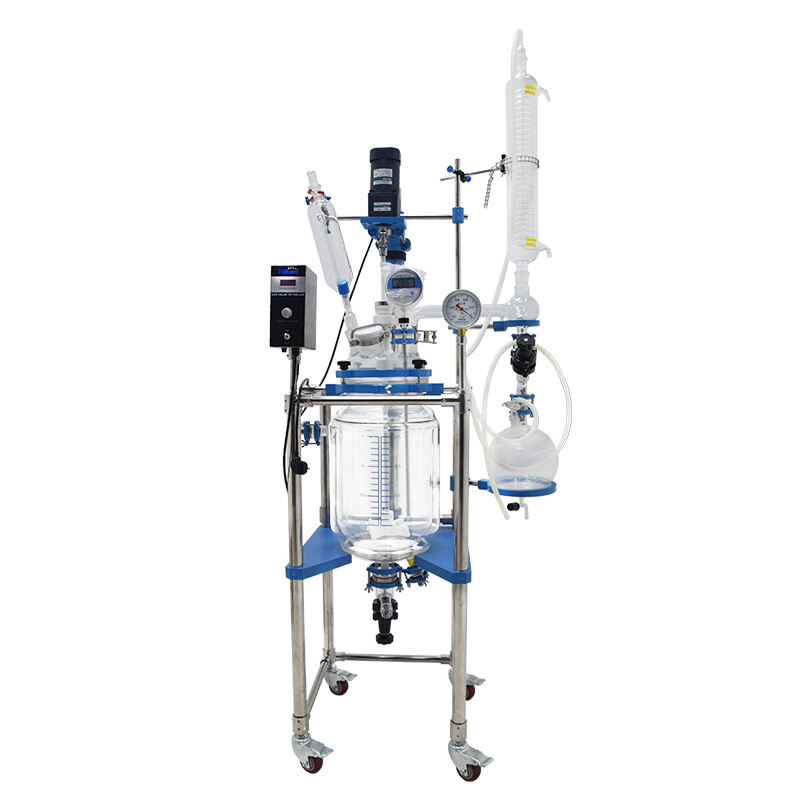A elección do reactor de vidro con chapa axeitada garante que os procesos químicos funcionen de forma eficiente e segura. Necesitas un reactor que se adapte ás túas necesidades operacionais. Factores como a capacidade, a calidade do material e as temperaturas afectan directamente o rendemento. Priorizar as características de seguridade tamén protexe ao teu equipo e equipos durante as operacións.
Entender o reactor de vidro con chaqueta adecuado
Un reactor de vidro revestido é un equipo especializado usado en procesos químicos. Ten un deseño de vidro de dúas capas, onde a capa exterior (ou chaqueta) permite o control da temperatura mediante a circulación de fluídos de calefacción ou refrixeración. Esta configuración garante unha regulación térmica precisa durante as reaccións. Pode usarse para mesturar, disolver ou sintetizar produtos químicos en condicións controladas. A súa construción de vidro transparente permite controlar as reaccións en tempo real, o que o converte nunha valiosa ferramenta tanto en contextos de investigación como industriais.
Atoparás reactores de vidro con camisa nunha variedade de aplicacións. Nos laboratorios, úsanse para a síntese química, cristalización e destilación. As industrias dependen deles para ampliar procesos, probar formulacións e producir pequenos lotes de produtos químicos especiais. A súa versatilidade fainos adecuados para farmacéuticos, petroquímicos e incluso para o procesamento de alimentos. Elixir o reactor de vidro con camisa axeitado garante que poidas levar a cabo estas tarefas de forma eficaz mantendo a seguridade e precisión.
Factores clave para escoller o reactor de vidro con chaqueta adecuado
Debes considerar o volume de materiais que pretendes procesar. Os reactores de vidro con chaqueta teñen varios tamaños, desde pequenas unidades de laboratorio ata grandes reactores industriais. Un reactor máis pequeno funciona ben para investigación ou probas, mentres que os máis grandes son axeitados para operacións de produción a escala. A elección do tamaño adecuado garante un uso eficiente dos recursos e evita custos innecesarios.
O material do reactor debe soportar os produtos químicos que empregues. A maioría dos reactores de vidro revestidos están feitos de vidro borosilicato, que resiste a corrosión e choque térmico. Non obstante, debe confirmar a súa compatibilidade cos seus produtos químicos específicos. Usar o material incorrecto pode causar danos ou contaminación, comprometendo os seus resultados.
O control da temperatura e a presión son críticos nos procesos químicos. Debería comprobar a temperatura máxima e a presión do reactor para asegurarse de que cumpren os seus requisitos. Un reactor con clasificacións insuficientes pode fallar en condicións extremas, o que supón riscos de seguridade.
Os reactores de unha camisa son máis simples e económicos, ideais para as necesidades básicas de calefacción ou refrixeración. Os deseños de chaqueta doble ofrecen un control de temperatura máis preciso ao permitir a circulación de fluídos separados. Debería escoller baseándose na complexidade dos seus procesos.
A seguridade debe ser sempre a prioridade. Busca características como válvulas de alivio de presión, revestimentos a proba de roturas e sistemas de apagado de emerxencia. Estas características protexen a vostede e ao seu equipo durante o seu funcionamento.
Consideracións prácticas para a selección
Debería priorizar un reactor de vidro con chaqueta que simplifique o mantemento e limpeza. Un deseño con superficies lisas e mínimas fendas reduce o risco de acumulación de residuos. Os compoñentes extraíbles, como os agitadores e válvulas, fan que a limpeza sexa máis eficiente. A mantemento regular garante que o reactor funcione ao máximo rendemento e prolonga a súa vida útil.
O equilibrio entre calidade e custo é esencial á hora de seleccionar un reactor. Aínda que os modelos de gama alta ofrecen características avanzadas, poden exceder o seu orzamento. Avaliar os seus requisitos de proceso e escoller un reactor que satisfaga as súas necesidades sen extras innecesarios. Investir nun reactor duradeiro e fiable minimiza os custos a longo prazo.
Asegúrese de que o reactor se integre perfectamente coa configuración actual. Comprobar as dimensións, portos e tipos de conexión para evitar problemas de compatibilidade. Un reactor que funcione ben co equipo existente simplifica as operacións e evita gastos adicionais.
Escoller un proveedor de boa reputación garante que reciba un produto de alta calidade. Investiga as opinións dos clientes e pregunta sobre garantías ou servizos posvenda. O apoio fiable do provedor axuda a resolver calquera problema rapidamente, mantendo as súas operacións funcionando sinxelos. 1
Conclusión
A elección do reactor de vidro con chapa axeitada garante que os seus procesos funcionen de forma eficiente e segura. Concentrarse en factores clave como a capacidade, a calidade do material e as características de seguridade. Avalia as túas necesidades con coidado antes de tomar unha decisión. Consulte aos provedores para obter consellos expertos para atopar o mellor adecuado para as súas operacións.

